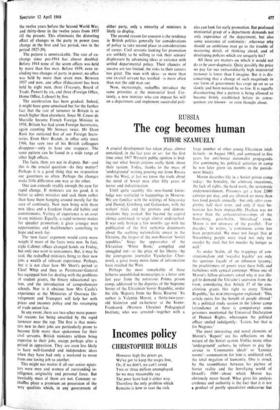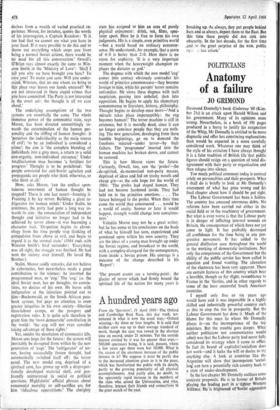The cog becomes human
RUSSIA TIBOR SZAMUELY
A crucial development has taken place, almost unnoticed, in the last year or so: for the first time since 1917 Western public opinion is find- ing out what Soviet citizens really think about their system. Today, thanks to the mass of 'underground' writing pouring out from Russia . into the West, at last we know the truth about the mind of Soviet man after fifty years of terror and indoctrination.
Until quite recently this new-found know- ledge was restricted to happenings in Moscow. We are familiar with the writings of Sinyaysky and Daniel, Ginsburg and Galanskov, with the writers' trials and the protests and demon- strations they evoked. But beyond the capital silence continued to reign almost undisturbed. It was only broken a few months ago with the publication of the first authentic documents about the seething nationalistic unrest in the Ukraine, the largest of the non-Russian 'Soviet republics.' Since the appearance of the Ukrainian 'White Book,' compiled and smuggled out—at the price of his liberty—by the courageous journalist Vyacheslav Chor- novil, a great many more items of information have reached the West.
Perhaps the most remarkable of these hitherto unpublished manuscripts is a letter sent last year from the notorious Potma prison camp, addressed to the deputies of the Supreme Soviet of the Ukrainian Soviet Republic, under the title 'Reports from the Beria Reserve.' Its author is Valentin Moroz, a thirty-two-year- old historian and ex-lecturer at the Ivano- Frankovsk (Western Ukraine) Pedagogical Institute, who was arrested—together with a large number of other young Ukrainian intel- lectuals—in August 1965, and sentenced to five years for anti-Soviet nationalist propaganda (for continuing his political activities in camp he was later given six months in the punish- ment block).
Moroz describes life in a Soviet prison camp today: the brutality, the arbitrary executions, the lack of rights, the hard work, the systematic undernourishment. Prisoners get a bare 2,000 calories per day, and arc allowed no more than two food parcels annually—but only after com- pleting half their term, and only if their be- haviour has been impeccable. Dachau was no worse than the concentration-camps of the flourishing, post-Stalin, 'liberalised' USSR. Moroz is not unaware of the parallel: 'For decades,' he writes, 'a continuous crime has been perpetrated. We must not forget that at Nuremberg people were tried not only for murder by steel, but for murder by hunger as well.'
As under Stalin, all the trappings of con- stitutionalism and 'socialist legality' are only the spurious facade of an inhuman tyranny; the practitioners of power treat these frills and furbelows with cynical contempt. When one of Moroz's fellow-prisoners asked why it was ille- gal to demand the Ukraine's secession from the USSR, considering that Article 17 of the con- stitution grants this right to every 'Union Republic,' his KGB interrogator explained: 'This article exists for the benefit of people abroad.' At a political study session in the labour camp (attendance at these is compulsory) some prisoners mentioned the Universal Declaration of Human Rights, whereupon the political officer smiled indulgently : 'Listen, but that is for Negroes.' The most interesting and novel elements of Moroz's 'Report' are his reflections on the nature of the Soviet system. Unlike many other 'underground' authors, he refuses to pay lip- service to 'Communist ideals' or 'Leninist norms'—communism for him is undiluted evil, the total negation of humanity. One is struck by the resemblance between his picture of Soviet reality and the horrifying world of Orwell's /984—about which Moroz has obviously never heard. What gives his analysis credence and authority is the fact that it is not a product of purely speculative endeavour but derives from a wealth of varied practical ex- perience. Moroz, for instance, quotes the words of his interrogator, a Captain Kazakov: 'It is too bad that we cannot see what you have in your head. If it were possible to do this and to throw out everything which stops you irom being a normal Soviet citizen, there would be no need for all this conyersation. Orwell's O'Brien says almost exactly the same to Win- ston smith in the 'Ministry of Love': 'Shall I tell you why we have brought you here7 To cure you! To make you sane. Will you under- stand, Winston, that no one whom we bring to this place ever leaves our hands uncured? We are not interested in those stupid crimes that you have committed. The Party is not interested in the overt act: the thought is all we care about.' , The underlying assumptions of the two systems are essentially the same. The whole fmmense power of the communist state, says Moroz, has been directed unremittingly , to- wards the extermination of the human per- sonality and the stifling of human thought: it 'perceives the individuality as the main source of evil'; `to be an individual is considered a grime; the aim is `the complete blending of individuals into a grey mass, a return to a solid icon-organic, non-individual existence.' Under totalitarianism man becomes 'a fertilizer for progress.' Thought is to be prohibited : 'the peciPle convicted for anti-Soviet agitation and propaganda are people who think otherwise, or Who think at all.'
How, asks Moroz, 'can the endless spon- taneous movement of human thought be stopped? There is one last resort—freezing it. Freezing it by icy terror. Building a giant re- frigerator for human minds.' Under Stalin, he continues, the party had gone a long way to- 'Wards its aim : the renunciation of independent thought and initiative no longer had to be achieved by terror alone—it was becoming a Character trait. 'Despotism begins its chron- ology from the time people stop thinking of cOmpulsion from above as evil, and begin to .regard it as the normal state.' (1984 ends with Winston Smith's final surrender: 'Everything was all right, the struggle was finished. He had won the victory over himself. He loved Big `Brother.) Stalin, Moroz acidly remarks, did not believe in cybernetics, but nevertheless made a great Contribution to the science: he invented the programmed man, or 'cog.' The 'cog,' i.e. the ideal Soviet man, has no thoughts, no convic- ' lions, no desires of his own. He burns with indignation at the injustices pointed out to him—Buchenwald, or the South African pass- book system; but pays no attention to even greater iniquities in his own societySiberian slave-labour camps, or the passport and registration rules. It is quite safe therefore_ to grant him the 'most democratic' constitution in the world : 'the cog will not even consider taking advantage of these rights.'
Yet, amidst the desolation of communist life, Moroz sees hope for the future: the system will _inevitably be disrupted from within by the new generation of 'cogs.' The 'refrigerator' .of ter- ror, having successfully frozen thought, had automatically switched itself off : the terror eased. The new model cog, deprived of a spiritual core, has grown up with a dispropor- Iionally developed material shell, and pro- " ioundly uninterested in social or political queitions. Highfalutin+ official phrases ahOut communist morality Or self-sacrifice are for him 'ridichlons sUperatitions.' The almighty state has assigned to him an area of purely PhysiCal enjoyment : drink, sex,. films, spec- tator sport. Here he is free to form his own judgments. His is a simple, even primitive world —but a, world based on ordinary common- sense. He understandi, for example, that a score of 4:0 'is better than 2 :0.1-tere there no room for sophistry. 'It is a very impoitant moment when the heavyweight champion re- places the dictator as god.' The dogmas With which the new model 'cog' comes into contact obviously contradict his world of primitive commonsense—they become foreign to him, While his parents' terror remains unfamiliar. He views these dogmas with tacit scepticism, passing into unbelief, then into opposition. He begins to apply his elementary commonsense to literature, history, Philoiophy. Thought begins to develop once more—`And a miracle takes place imperceptibly:, the cog becomes human!' The terror machine is still in existence, but it is morally dead, since it can no longer convince people that they are noth- ing. The new generation, developing from these humble beginnings, go on to demand the freedoms rejected—under terror—by their. fathers. The 'programme' inserted into the human machine has broken down, and cannot be restored. This is how Moroz views the future. Curiously, Orwell, too, saw the 'prolesHthe -de-spirited, de-memorised non-party masses, deprived of ideas and fed on trashy novels and cheap gin—as the sole hope for the world of 1984: The proles had stayed human. They had not become hardened inside. They had held on to the primitive emotions. , . . The future belonged to the proles. When their time came the world they constructed . . . would be a world of sanity. Sooner or later it would happen, strength would change into conscious- ness.'
, Valentin Moroz may not be a great writer; but he has come to his conclusions on the basis of what he himself has seen, experienced and pondered upon within his own country. They are the ideas of a young man brought up under the Soviet regime, and broadcast to the world, with a complete disregard for the consequences, from inside a Soviet prison. His courage is a measure of the change described in his `Report': `The present events are a turning-point : the glacier of terror which had firmly bound the spiritual life of the nation for many years is breaking up. As always, they put people behind ,bars and as always, deport them to the East. But this time these people did not sink into obscurity. In the last decade, for the first time _and to the great surprise of the KGB, public opi has arisen.'











































 Previous page
Previous page